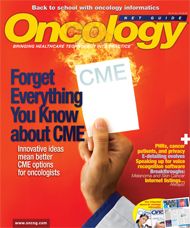Publication
Article
Social Media Notebook - The Personal Health Record Conundrum: Is Privacy a Red Herring?
Concerns about online PHRs are overblown given that Americans have become avid users of Internet-based financial services.
Over the past decade, numerous corporations, government agencies, and other organizations have tried, to no avail, to coax consumers and providers to use personal health records (PHR). According to a July 2007 Virtual Medical News article, only 2% of the population is using PHRs. However, the PHR train is once again picking up steam, with proponents more convinced than ever they can convince people to use PHRs. Microsoft (HealthVault) and Google (Google Health) are leading the latest efforts to develop the killer PHR application.
Despite the excitement surrounding the evolution of the PHR, many people are very worried. Dr. Deborah Peel, a Texas psychiatrist and founder of Patient Privacy Rights, is one of them. Her organization wants consumers to retain complete control over their medical information. She told the Washington Post earlier this year that she is very concerned about PHRs because of the danger that health insurers will use information stored within them to deny coverage. She is also worried that marketers will use highly personalized information in PHRs to sell health products to consumers.
Some PHR boosters disagree. They argue that reputable PHR developers have every incentive to protect users’ confi dential information. They also believe that concerns about online PHRs are overblown given that Americans have become avid users of Internet-based financial services, including banking and credit monitoring. In addition, some have suggested that PHR opponents are using privacy as an excuse to do nothing in order to maintain the status quo or to oppose government involvement in the US health system.
Is privacy the red herring of the PHR debate?
Clearly, privacy is a critically important issue. However, it may be distracting us from an equally important issue in the debate over PHRs. Specifi cally, why has consumer uptake been so limited? Fear may be one reason. Th ose with embarrassing or stigmatized conditions may be unwilling to trust a PHR vendor with information about their condition. Another may be apathy. In a widely-cited blog post, health policy analyst Dr. Brian Klepper said: “Even though health care information can have serious utility for individuals, many of us simply don’t appear to be built to chase and use it.” Is it any wonder consumers have not been very interested in researching and employing PHRs?
Are healthcare social media users the perfect PHR users and ambassadors?
While the barriers to PHR adoption are signifi cant, they are not insurmountable. Rather than focusing on the broad public, the key may be to recruit Americans who are vocal, infl uential, and comfortable using online technologies for health purposes. Healthcare social media users may be the perfect initial target for PHR developers. Th is is because they:
- Are likely to be active and engaged managers of their health
- Can educate others about the privacy issues associated with storing and sharing personal health information online and off PHR vendors may also be able to employ social media technologies to educate others about the benefi ts and drawbacks of PHR services.
This can be achieved via a lightly moderated social network or user/expert-produced wiki that helps to answer key questions and assuage fears about PHR technology. Although the debate over privacy is important, we should not let ourselves be distracted from the real issue: slow PHR uptake. Employing various social media technologies and engaging potential users may be one means of increasing the number of people willing to take a chance on PHRs.
Fard Johnmar is the founder of Envision Solutions, LLC, a fullservice healthcare marketing communications consulting fi rm. Visit www.envisionsolutionsnow.com to learn more about the company and the services it offers.
